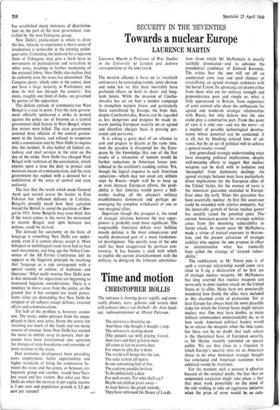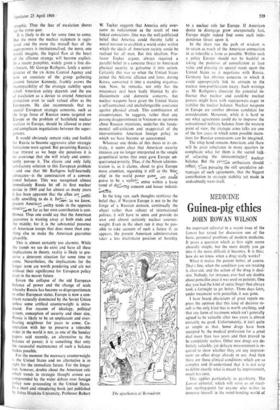Towards a nuclear Europe
SECURITY IN THE 'SEVENTIES LAURENCE MARTIN
Laurence Martin is Professor of War Studies in the University of London and defence correspondent of the SPECTATOR.
The western alliance is beset on its twentieth anniversary by converging trends, some obvious and some less so, that must inevitably have profound effects on both its short- and long- term future. While the invasion of Czecho- slovakia has set on foot a modest campaign to strengthen western forces and particularly those contributed by Europe, the hope that, despite Czechoslovakia, Russia can be regarded as less dangerous and progress be made to- wards putting European security on an agreed and therefore cheaper basis is proving per- sistent and pervasive.
It is asking a great deal of an alliance to arm and prepare to disarm at the same time. And the paradox is sharpened for the Euro- peans by the knowledge that one of the first results of a relaxation of tension would be further reductions in American forces con- tributed to the coalition's standing armies. Yet, though the logical response to such American reductions—which may not await any definite steps by Russia—might well be to keep up or even increase European efforts, the prob- ability is that America would prove a bell-- wether leading all the alliance's military establishments downward and perhaps' en- couraging the complete withdrawal of one or two marginal allies.
Important though this prospect is, the trend of strategic relations between the two super- powers is probably even more significant. The irrepressible American debate over ballistic missile defence is the most conspicuous and readily dramatised part of a more fundamen- tal development. The specific issue' of the ABM itself has been exaggerated by partisan con- troversy. It has become a stick with which to exploit the current disenchantment with the military, to dehigrate the Johnson administra- tion—from which Mr McNamara is usually tactfully dissociated—and to advance the presidential candidacy of Edward Kennedy. The critics fear the ABM will set off an accelerated arms race and spoil chances of crystallising an agreed strategic stalemate with the Soviet Union. Its advocates are drawn either from those who are for military strength and preponderance pure and simple or, what is little appreciated in Britain, from supporters of arms control who share the enthusiasm for agreed and moderate strategic relationships with Russia but who believe that the ABM could play a constructive part. From this point of view it is only one—and not the worst—of a number of possible technological develop- ments whose potential can be contained, if at all, not by blocking isolated lines of ad- vance, but by an act of political will to achieve a general modus vivendi.
Any generalised strategic understanding must have sweeping political implications, despite well-meaning efforts to suggest that nuclear weapons can be dealt with in isolation and 'decoupled' from diplomatic dealings. An agreed strategic balance must have particularly direct implications for the European allies of the United States, for the essence of NATO is the American guarantee extended to Europe. -Ever since the early 'fifties this guarantee has been essentially nuclear. At first this assurance could be extended with relative immunity, but ' the inexorable growth of Soviet nuclear power has steadily raised the potential price. The-- current American passion for strategic stability: arises from this mounting vulnerability to Soviet attack. In recent years Mr McNamara , made a virtue of mutual exposure to destruc- tion, and the present advocates of strategic stability who oppose the ABM propose in effect to institutionalise what has ironically been called the strategy of 'assured vulner- ability.'
The codification, as Mr Nixon puts it, of such a strategic relationship would come very close to bang a declaration of no first use of strategic nuclear weapons. Mr McNamara has long asserted that nuclear weapons can serve only to deter nuclear attack on the United States or its allies. Many have not unnaturally wondered how firmly the allies were included in this charmed circle of protection. Yet at least Europe has always been the most plausible stake for which the United States might initiate nuclear war. One may have doubts, as many military commanders understandably do, as to how ready American political leaders would be to release the weapons when the time came, but there can be no doubt that such release is the theoretical basis of European security, as. Mr Healey recently reminded an uneasy public. We are thus close to a situation in which Europe's security rests on an American threat to do what American strategic thought has concluded and American statesmen have admitted would be irrational.
For the moment such a posture is effective because of the residual doubt, the fear that an unintended escalation might take place, a fear that must work powerfully on the mind of the side wishing to take an aggressive initiative when the price of error would be so cata- strophic. Thus the fear of escalation shores up the status quo.
It is likely to do so for some time to come. But the more the nuclear stalemate is regis- tered and the more the mutat fear of the superpowers is institutionalised, the more, one would imagine, the logical flaw at the heart of the alliance strategy will become explicit. In a recent pamphlet, widely given a free dis- tribution, Mr George Rathgens, lately a senior director of the us Arms Control Agency and now an associate of the group gathering around Senator Kennedy, frankly avows the incompatibility of the strategic stability upon which American safety depends and the use of escalation as a device to extend American protection even to such valued allies as the Europeans. He also recommends that no special European strategic concerns, such as the large force of Russian IRBMS targeted on Europe or the problem of battlefield nuclear warfare in Europe, should be allowed to enter and complicate negotiations between the super- powers.
It would obviously remain risky and foolish for Russia to become aggressive after strategic limitations were agreed. But perceiving Russia's true interest as we hope she perceives it is no assurance that she will wisely and consis- tently pursue it. The classic and only fully satisfactory solution to this European problem —and one that Mr Rathgens half-heartedly advocates—is the construction of a conven-.. tional balance. This was recognised almost immediately Russia let off its first nuclear device in 1949 and for almost as many years it has been apparent that the allies are cally unwilling to do it.In As We know, present America'.-,Duey tends in the opposite
directior. .r ..sirst tar as her own contribution is con- cerned. Thus one could say that the American guarantee is wasting away at both ends and the middle; for it is the substantial presence of American troops that does more than any- thing else to make the American guarantee plausible.
This is almost certainly too alarmist. While the trends we see do exist and have all these implications in theory, reality is likely to pre- serve a deterrent situation for some time to come. Nevertheless, the implications for the longer term are worth pondering and ale not without their significance for European policy even in the nearer future.
Given the collapse of the old European balance of power and the change of scale whereby Russia has become so disproportionate to other European states, Europe is now a con- tinent naturally dominated by the Soviet Union unless some artifical counterweight is intro- duced. For reasons of ideology, political system, conception of security and sheer size, Russia is likely to be an unpleasant and over- bearing neighboUr for years to come. Co- operation with her to preserve a tolerable order in the world is not, as one of the Sunday papers said recently, an alternative to .the balance of power; it is something that only the successful maintenance of such a balance makes possible.
For the moment the necessary counterweight is the United States and no alternative is in sight for the immediate future. For the longer run, however, doubts about the American role which trends in strategic thought arouse are compounded by the wider debate over foreign policy now proceeding in the United States. In a short and stimulating book just published by Johns Hopkins University, Professor Robert
W. Tucker suggests that America only over- came its isolationism as the result of two linked convictions. One was the well-publicised belief that America could thereby fulfil a moral mission to establish a world order within which the ideals of American society could be realised for all men. But this idealism, Pro- fessor Tucker argues, always required a parallel belief in a concrete threat to American physical security to galvanise it into action. Certainly this was so when the United States joined the Atlantic alliance and later, during Korea, converted it into a standing organisa-. tion. Now, he remarks, not only has the missionary zeal been badly blunted by dis- illusionment and domestic concerns, but nuclear weapons have given the United States a self-contained and unchallengeable assurance against physical attack. This combination of_ circumstances, he suggests, rather than any passing disappointment in Vietnam or optimism about Russian intentions, underlies the funda- mental self-criticism and reappraisal of the interventionist American foreign policy to which we have become so accustomed.
Whatever one thinks of this thesis in its en- tirety, it seems clear that American security interests are no longer interpreted in the simple geopolitical terms that once gave Europe un- questioned priority. Thus, if the Nixon adminis- tration is, as it claims, about to give Europe more :attention, regarding it still as the `blue. chip' in the world power game tits could prove to be a move within a basic
trend of dejf„,nik concern and looser indenti- g • . ecoatibn.
In the long run, such thoughts reinforce the belief that, if Western Europe is not to be the fringe of a Russian domain, continually the object rather than subject of international politics, it will have to unite and provide its own and almost certainly nuclear counter- weight. Even in the short run it may be pos- sible to take account of such a future if, as appears, the present American administration takes a less doctrinaire position of hostility
The apotheosis of Bernadette.
to a nuclear role for Europe. If American desire to disengage grew unexpectedly fast, Europe might indeed find some such inde- pendence thrust upon it.
In the short run the path of wisdom is to retain as much of the American connection in as tolerable a form as possible. Within such a policy Europe should not be bashful in taking the promises of consultation at face value and pressing its special needs upon the United States as it negotiates with Russia. Germany has obvious concerns to which it could appropriately link its attitude to the nuclear non-proliferation treaty. Such writings as Mr Rathgens's illustrate the potential in- fluence that nuclear and could-be nuclear powers might have with superpowers eager to stabilise the nuclear balance. Nuclear weapons in Europe are another obvious candidate for consideration. Moreover, while it is hard to see what agreements could do to improve the conventional military balance from the western point of view, the strategic arms talks are one of the few areas in-which some possible incen- tives for Russian concessions can be imagined.
The whip hand remains American, and there will be great reluctance in many quarters to complicate what for them is the sacred task.. of adjusting the intercontinenL2l nuclear
balance. But the enthusiasts should reflect: ye:mil pursuing the still speculative ad- vantages of such agreements, that the biggest contribution to strategic stability yet made Is undoubtedly NATO itself.











































 Previous page
Previous page